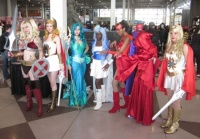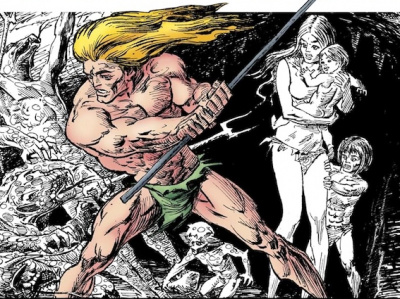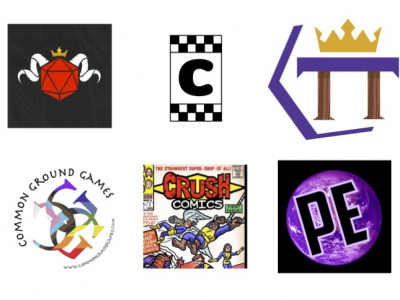 Confessions of a Comic Book Guy is a weekly column by Steve Bennett of Super-Fly Comics and Games in Yellow Springs, Ohio. This week, Bennett explores the world of female cosplayers and whether they're "real" fans.
Confessions of a Comic Book Guy is a weekly column by Steve Bennett of Super-Fly Comics and Games in Yellow Springs, Ohio. This week, Bennett explores the world of female cosplayers and whether they're "real" fans.A couple weeks ago I wrote about what happened to cosplayer Mandy Caruso at NYCC (see "Confessions of a Comic Book Guy--Don't Be That Guy"). In the interim there's been a bit of a backlash against cosplay at cons that's escalated into an attack on "fake nerd girls," the most incendiary comment probably coming in the form of a Facebook post from comic book artist Tony Harris. Along with making some rather some ugly attacks on their attractiveness (of the "they're not so hot" variety) he argued these women were ruining cons by drawing attention away from the writers and artists.
That and they're really not fans, not real fans anyway. I read a lot of similar rants from male fans online that amounted to variations on the "Fake Geek/Nerd Girl" meme, which in short goes something like "pretty girls are only pretending to be geeks to get male attention." Or, "Women like them are just ignorant outsiders so desperate for attention they parade around in skimpy little outfits." But you can, and I will, make the argument that by dressing that way cosplayers are bigger fans than most of us will ever be.
I mean any comic fan can buy a T-shirt* or hat with a superhero logo, the same way any sports fan can support their team by wearing licensed gear. But it's readily agreed the ultimate sport fans are the ones who show up for games in "skimpy outfits" (i.e. pants and bodypaint), sporting rainbow afro wigs with their faces painted team colors. OK, sure, other sports fan might make fun of them; they provide an outermost marker buoy for acceptable behavior, as in "I may watch a lot of football but at least I'm not one of those guys." But they would never question their commitment to the team by saying they were primarily "doing it for attention."
But cosplayers couldn't be the ultimate fans, not with them being, you know, women. And not only women but attractive ones who are easy to see as stand-ins for all the girls from high school who wouldn't give comic book guys like us the time of the day. After decades of being ostracized for liking what we like it's far easier for some of us to treat their interest in "our stuff" with disbelief and suspicion.
Not to oversimplify the situation, but as far as I can tell it boils down to resentment towards outsiders infringing on our subculture and gender issues. And it's not like I can't relate; I can still remember the sting when the cool kids that shamed me for reading Robert A. Heinlein's The Star Beast started to glowingly recommend The Lord of the Rings. The same way I'll never forget being called out for "carrying my books like a girl" in junior high, but that doesn't mean you get to feel threatened when someone has the effrontery to share your interests. Or as a female friend said after reading some of the comments, "When I started reading comics as a ten-year-old in 1975, I just didn't realize how many people I was hurting!"
There have been a number of insightful takes on the subject, like "The Myth of the Fake Geek Girl" by associate Dark Horse Comics editor Rachel Edidin that I read on the i09 site (though it first appeared on Comics Alliance). Or "Fake Geek Girls: The Geeks Have Inherited The Earth, But What's Next?" by Alyssa Rosenberg. But the one you really need to read is "'Fake Geek Girls': How Geek Gatekeeping Is Bad For Business" by Daniel Nye Griffiths that appeared on the Forbes website back on July 26. This excerpt from it says exactly why we can literally no longer afford to tolerate this kind of attitude; it's bad for business:
"Monocultures are risky business, diversification a useful hedge in times of change, and women's dollars are as good as men's. In particular, the traditional commodities of geekery--comics books, cult TV series and video games--and going through a complete and painful transition in business model under the pressure of digital distribution, the normalization of copyright infringement and the increasing ill-health of their direct retail channels. Meanwhile, the successes claimed by geeks over the dominant culture--such as the billion-dollar successes of this year's Avengers and (soon) Batman films--have come by expanding audiences out of the core demographic."
* In 1966 at the apex of Batmania I of course desperately wanted a Batman T-shirt. I have no idea what one would have cost in 2012 dollars but at that moment it definitely was too much for our blue collar household budget. So my mother, god rest her soul, painstakingly sewed a bat insignia on a gray sweatshirt. The next day I was of course declared "Fatman." I never wore it again.
The opinions expressed in this column are solely those of the writer, and do not necessarily reflect the views of the editorial staff of ICv2.com.







